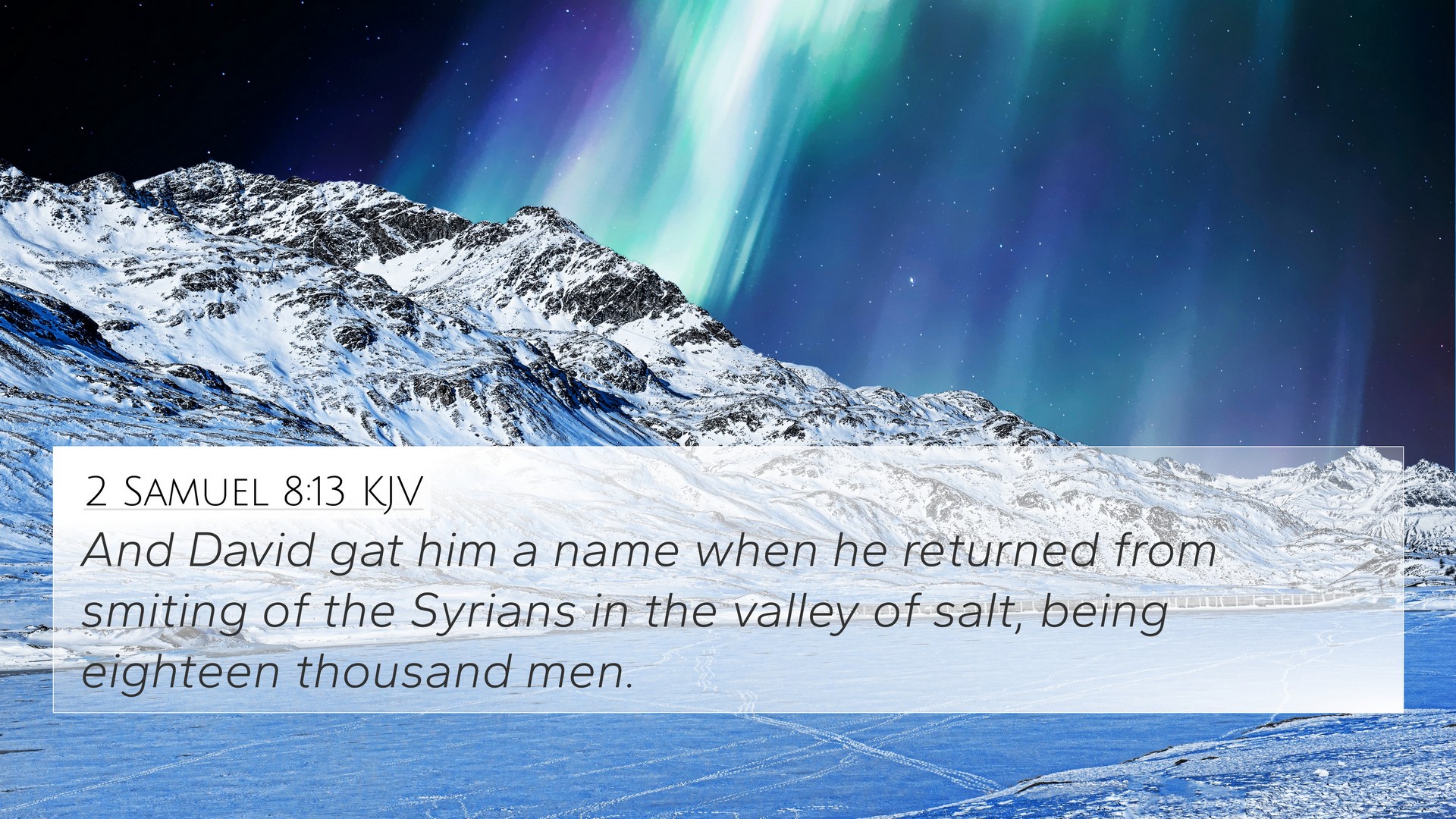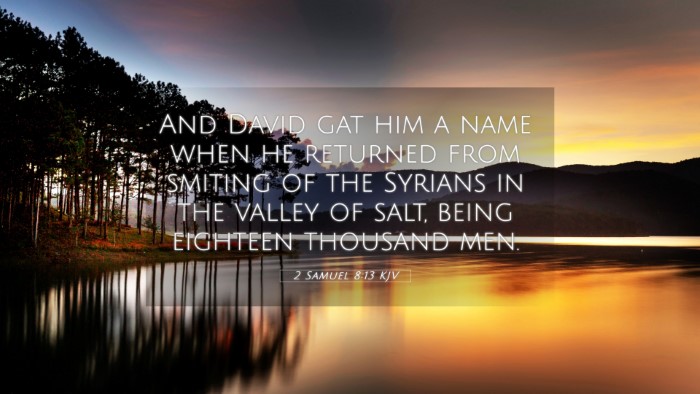Old Testament
Genesis Exodus Leviticus Numbers Deuteronomy Joshua Judges Ruth 1 Samuel 2 Samuel 1 Kings 2 Kings 1 Chronicles 2 Chronicles Ezra Nehemiah Esther Job Psalms Proverbs Ecclesiastes Song of Solomon Isaiah Jeremiah Lamentations Ezekiel Daniel Hosea Joel Amos Obadiah Jonah Micah Nahum Habakkuk Zephaniah Haggai Zechariah Malachi2 Samuel 8:13 Similar Verses
2 Samuel 8:13 Cross References
And David gat him a name when he returned from smiting of the Syrians in the valley of salt, being eighteen thousand men.
Uncover the Rich Themes and Topics of This Bible Verse
Listed below are the Bible themes associated with 2 Samuel 8:13. We invite you to explore each theme to gain deeper insights into the Scriptures.
2 Samuel 8:13 Cross Reference Verses
This section features a detailed cross-reference designed to enrich your understanding of the Scriptures. Below, you will find carefully selected verses that echo the themes and teachings related to 2 Samuel 8:13 KJV. Click on any image to explore detailed analyses of related Bible verses and uncover deeper theological insights.
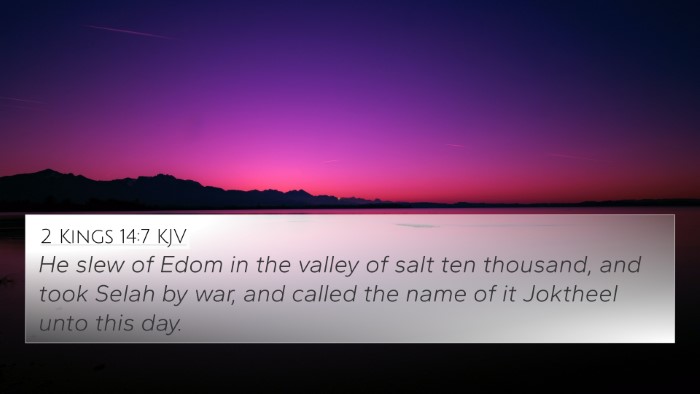
2 Kings 14:7 (KJV) »
He slew of Edom in the valley of salt ten thousand, and took Selah by war, and called the name of it Joktheel unto this day.
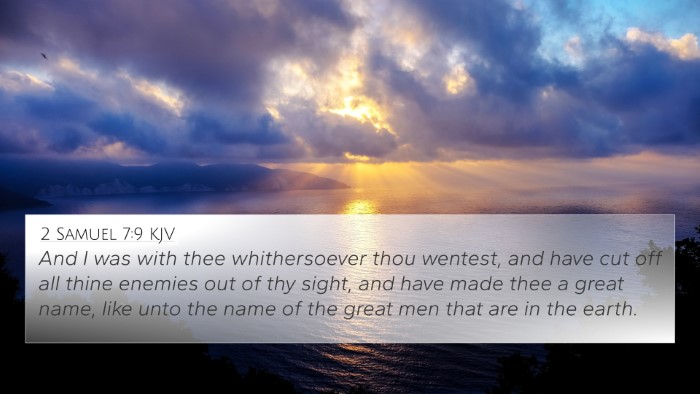
2 Samuel 7:9 (KJV) »
And I was with thee whithersoever thou wentest, and have cut off all thine enemies out of thy sight, and have made thee a great name, like unto the name of the great men that are in the earth.
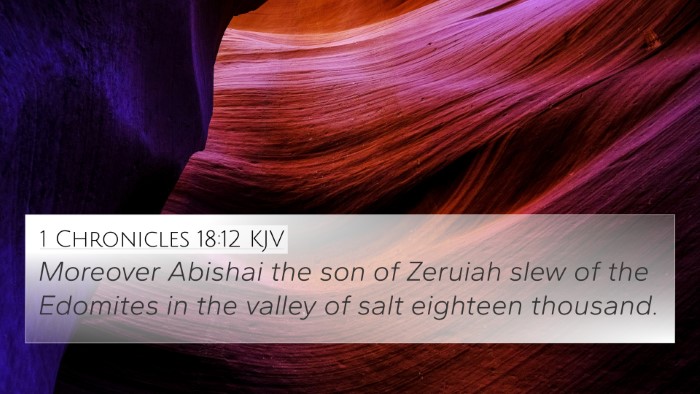
1 Chronicles 18:12 (KJV) »
Moreover Abishai the son of Zeruiah slew of the Edomites in the valley of salt eighteen thousand.
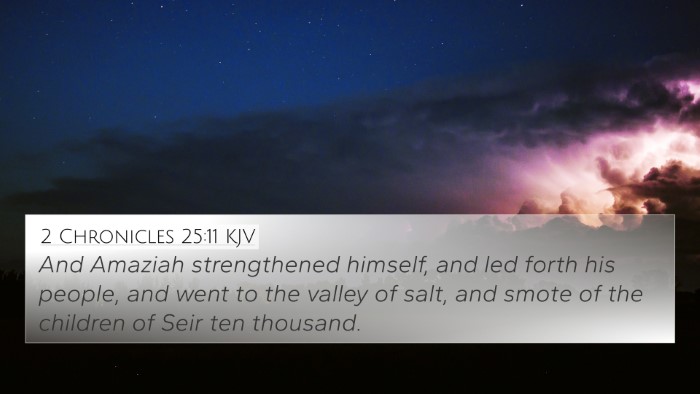
2 Chronicles 25:11 (KJV) »
And Amaziah strengthened himself, and led forth his people, and went to the valley of salt, and smote of the children of Seir ten thousand.
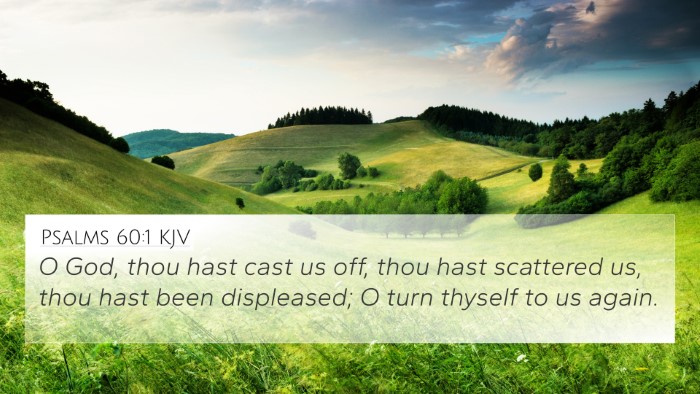
Psalms 60:1 (KJV) »
O God, thou hast cast us off, thou hast scattered us, thou hast been displeased; O turn thyself to us again.
2 Samuel 8:13 Verse Analysis and Similar Verses
Understanding 2 Samuel 8:13
Verse: "And David got him a name when he returned from smiting of the Syrians in the Valley of salt, being eighteen thousand men." - 2 Samuel 8:13 (KJV)
Meaning and Context
This verse summarizes a significant military achievement by King David. It highlights his return from a successful campaign against the Syrians, emphasizing not only the number of foes defeated but also the glory and reputation David garnered from this victory. The narrative situates this event in the broader context of David's reign and military conquests.
Military Victory and Reputation
Insights from Commentaries:
- Matthew Henry: Henry emphasizes that David's victory was a testament to God's favor and might, depicting David as a divinely appointed leader whose successes serve to further establish his authority over Israel.
- Albert Barnes: Barnes notes the significance of the "Valley of Salt," which indicates a geographical location relevant to the struggles faced by Israel and reminds readers of the larger battles against surrounding nations.
- Adam Clarke: Clarke discusses the implications of the number of slain, indicating that such a considerable number underscores the severity and scale of the battle, and serves to elevate David’s status among neighboring nations.
Cross-References
This verse relates to several others that reflect the theme of God empowering leaders for significant victories:
- 1 Chronicles 18:12: "Moreover Abishai the son of Zeruiah slew of the Edomites in the valley of salt ten thousand..." - This verse mentions a similar victory in the Valley of Salt.
- 2 Samuel 5:20: "And David came to Baal-perazim, and David smote them there, and said, The LORD hath broken forth upon mine enemies before me..." - A reflection on David’s martial successes.
- Psalm 60:1: "O God, thou hast cast us off; thou hast scattered us, thou hast been displeased; O turn thyself to us again." - This Psalm reflects on God's favor during battles.
- 2 Samuel 7:9: "And I was with thee whithersoever thou wentest, and have cut off all thine enemies out of thy sight..." - Reiteration of God’s support of David.
- Deuteronomy 20:4: "For the LORD your God is he that goeth with you, to fight for you against your enemies..." - God as the divine warrior for Israel.
- Psalm 144:1: "Blessed be the LORD my strength, which teacheth my hands to war, and my fingers to fight." – Acknowledging God’s role in providing strength for battle.
- Isaiah 54:17: "No weapon that is formed against thee shall prosper..." - Affirming divine protection and success in warfare.
Inter-Biblical Themes
The narrative of David's victory has profound implications in understanding the nature of divine kingship in biblical theology. The successful military engagements symbolize God’s presence and approval over Israel's chosen leader:
- Thematic Connections: Comparisons can be drawn between David and Jesus Christ, where both figures ultimately face opposition but enjoy divine endorsement and victory.
- Comparative Analysis: This verse stands in relation to the New Testament references to victory through Christ (e.g., Romans 8:37) highlighting the continuity of triumph through God’s appointed leaders.
Tools for Understanding and Study
For those looking to explore the connections within scripture further, consider the following resources and methods:
- Utilize a Bible concordance for detailed references across topics.
- Use a cross-reference Bible study guide to discover the links between this and other verses.
- Engage in cross-referencing Bible study methods for thematic explorations.
- Investigate Bible chain references to follow themes through various texts.
- Identifying connections between Old and New Testament for a deeper understanding of God's overarching narrative.
Conclusion
The victory highlighted in 2 Samuel 8:13 showcases the power of divine intervention and establishes David as a pivotal figure in Israel's history. By reflecting on the connections with other scriptures, believers can appreciate the theological implications of God's support for His chosen leaders and draw lessons applicable to their faith journeys.
